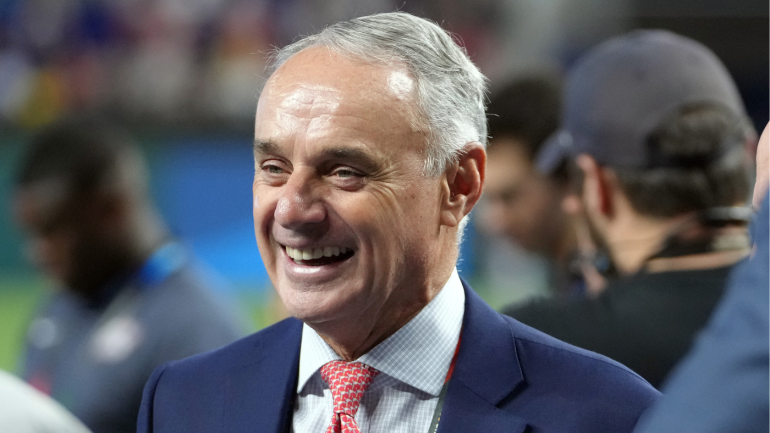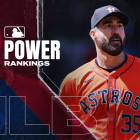
Major League Baseball commissioner Rob Manfred addressed the New York Mets' offseason spending as well as the possibility of the league implementing a salary cap during an appearance on Tuesday on the New York Post's The Show podcast, co-hosted by Joel Sherman and Jon Heyman.
"What [Mets owner Steve Cohen] spent in the offseason was completely consistent with all of our rules. He perfectly had every right to spend those dollars," Manfred said. "There are actually real benefits for the game associated with that spending. It does energize the Mets' fanbase.
"The downside is spending at that level, particularly at a level that kind of steps away from everybody else, emphasizes a problem that baseball, since I started in 1987, has grappled with. And that is the disparity in the revenues that are generated in our markets produces a challenge in terms of competitive balance."
The Mets, of course, had a busy offseason that saw them sign starting pitchers Justin Verlander, Kodai Senga, and José Quintana, as well as retain center fielder Brandon Nimmo and closer Edwin Díaz. All told, the Mets are expected to enter this season with an active payroll of $318 million, according to Spotrac's calculations, some $52 million higher than the next closest team.
Under MLB's Collective Bargaining Agreement with the MLB Players Association, teams are penalized financially (and, on occasion, through the draft) if they exceed the Competitive Balance Tax. The newest CBA even saw the owners implement a new tax level, a mechanism that was installed because the other clubs were fearful of Cohen's runaway spending potential. The Mets, as a result, are facing a projected tax bill of more than $100 million -- that is, more than nine teams are to spend on their entire payrolls this season.
MLB has since formed an "economic reform committee" in response to Cohen and the Mets' wild winter, hinting that more changes could be proposed as part of the next CBA. One of the most popular suggestions, if only because of branding and presence in other sports, is the concept of a salary cap. Predictably, Manfred was asked about that by Sherman and Heyman.
"But there is one truism that is hard to hard to ignore: There are arguably … five major professional sports in North America. Four of them have one system. One of them has a different system," Manfred said. "I'm sort of a believer in the idea that the majority eventually gets it right. When you're the outlier, you have to ask yourself the question of: Does somebody else have the system right?"
It should be noted that there's no actual evidence that salary caps improve competitive parity or balance. They are, however, an effective means of suppressing player salaries. The MLBPA has long resisted the idea of installing a salary cap (though the CBT has, in recent times, served as an unofficial cap). It doesn't appear that will change under Tony Clark's watch, either. Earlier this spring, he said that the union would "never" accept a proposal with a cap.






















